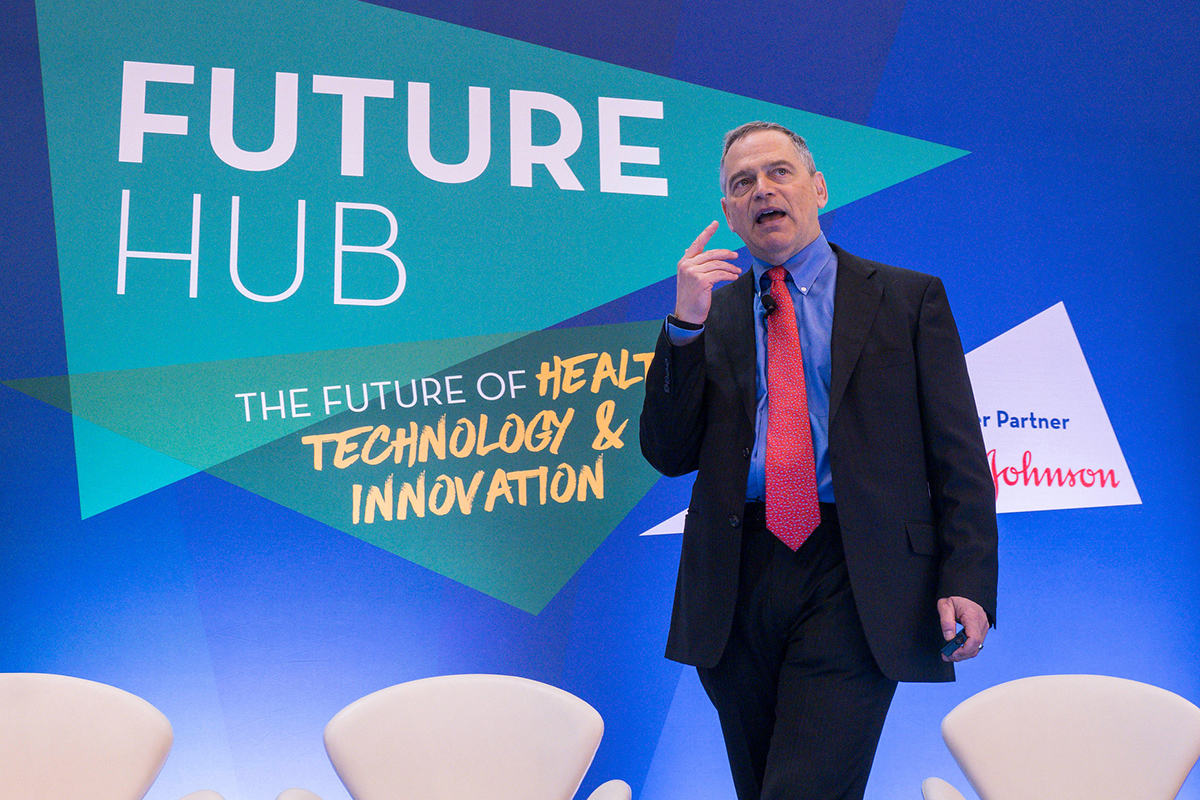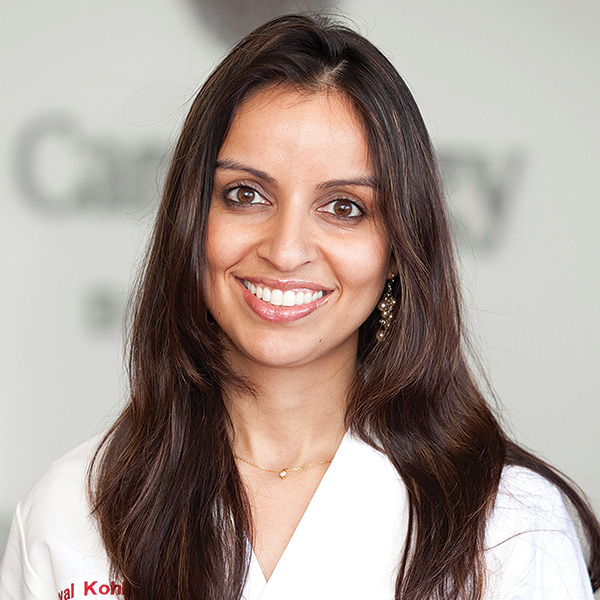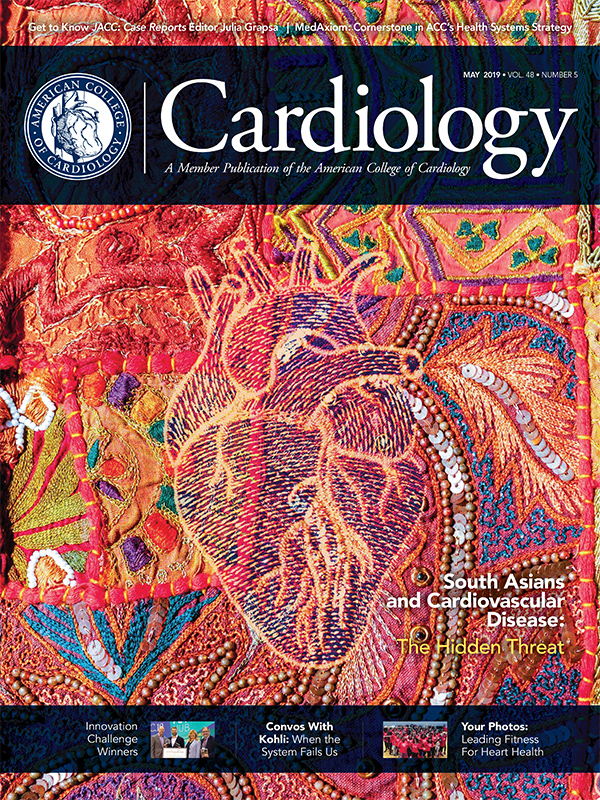Innovation at ACC | Future Hub Keynote: Realizing the Potential of Technology

Harlan M. Krumholz, MD, SM, FACC, characterized the advances in medical innovations so far as "using a rotary dial on a modern smartphone," noting the dissonance between the technological and cultural progress.
Unfortunately, the expectations we all held two decades ago for the coming digital era haven't been realized; it has failed to live up to the promise of enhancing our user experience, care of our patients or our technology.
In his article, Why Doctors Hate Their Computers in the New Yorker, Atul Gawande, MD, PhD, wrote: I've come to feel that a system that promised to increase my mastery over my work has, instead, increased my work's mastery over me.
These words, quoted by Krumholz in his Keynote, resonated with the audience, as it captured the feeling that regardless of how far we've walked, little progress has been made towards reaching our destination and that, paradoxically, the technological advances have added to our frustration and burnout.
The slow rate of generating data and evidence was another topic raised by Krumholz, despite the tools that produce data in everyday practice (electronic health records [EHRs], payors, patient-generated data/wearables, clinical trials/research, claims data).
One result of this is that many clinical guidelines are based on expert consensus (about half, based on a 2009 JAMA publication) rather than data.
"Humans are reductionist," he said, highlighting the challenges we currently face in collecting data in forums such as NCDR (where capture at times can be a binary yes/no to a complex question, such as type of dyslipidemia) and in applying simplified clinical risk scoring systems (such as CHA2DS2-Vasc score) to a heterogenous population.
Most titillating to me was his allusion to the power of artificial intelligence (AI) to enhance practice by learning from the experience of others. Every search on Google, purchase on Amazon and mile driven on Tesla makes those platforms perform more intelligently. The systems learn and evolve.
In contrast, physicians continue to practice in their silos with antiquated EHRs that are not interoperable – thus they are far from being able to integrate the experience of a physician in Hawaii with that of a physician in New York to benefit each other. Wouldn't it be amazing though if we could also get there one day… imagine the possibilities!
Krumholz proposed the creation of a centralized and standardized platform that integrated with multiple data sources, including EHRs, payors, clinical trials, patient wearables and claims data. He left the audience feeling hopeful and inspired stating such a system, if successful, would not replace doctors.
It would allow us to be faster, do more effective and efficient research, and have sophisticated AI – thereby we could improve patient outcomes. His Keynote was the perfect start to a weekend full of innovation, allowing the audience to start to dream of the infinite possibilities ahead.

Harlan M. Krumholz, MD, SM, FACC, characterized the advances in medical innovations so far as "using a rotary dial on a modern smartphone," noting the dissonance between the technological and cultural progress.
Unfortunately, the expectations we all held two decades ago for the coming digital era haven't been realized; it has failed to live up to the promise of enhancing our user experience, care of our patients or our technology.
In his article, Why Doctors Hate Their Computers in the New Yorker, Atul Gawande, MD, PhD, wrote: I've come to feel that a system that promised to increase my mastery over my work has, instead, increased my work's mastery over me.
These words, quoted by Krumholz in his Keynote, resonated with the audience, as it captured the feeling that regardless of how far we've walked, little progress has been made towards reaching our destination and that, paradoxically, the technological advances have added to our frustration and burnout.
The slow rate of generating data and evidence was another topic raised by Krumholz, despite the tools that produce data in everyday practice (electronic health records [EHRs], payors, patient-generated data/wearables, clinical trials/research, claims data).
One result of this is that many clinical guidelines are based on expert consensus (about half, based on a 2009 JAMA publication) rather than data.
"Humans are reductionist," he said, highlighting the challenges we currently face in collecting data in forums such as NCDR (where capture at times can be a binary yes/no to a complex question, such as type of dyslipidemia) and in applying simplified clinical risk scoring systems (such as CHA2DS2-Vasc score) to a heterogenous population.
Most titillating to me was his allusion to the power of artificial intelligence (AI) to enhance practice by learning from the experience of others. Every search on Google, purchase on Amazon and mile driven on Tesla makes those platforms perform more intelligently. The systems learn and evolve.
In contrast, physicians continue to practice in their silos with antiquated EHRs that are not interoperable – thus they are far from being able to integrate the experience of a physician in Hawaii with that of a physician in New York to benefit each other. Wouldn't it be amazing though if we could also get there one day… imagine the possibilities!
Krumholz proposed the creation of a centralized and standardized platform that integrated with multiple data sources, including EHRs, payors, clinical trials, patient wearables and claims data. He left the audience feeling hopeful and inspired stating such a system, if successful, would not replace doctors.
It would allow us to be faster, do more effective and efficient research, and have sophisticated AI – thereby we could improve patient outcomes. His Keynote was the perfect start to a weekend full of innovation, allowing the audience to start to dream of the infinite possibilities ahead.
Clinical Topics: Diabetes and Cardiometabolic Disease, Dyslipidemia, Prevention, Stress
Keywords: ACC Publications, Cardiology Magazine, Information Storage and Retrieval, Electronic Health Records, Artificial Intelligence, Dyslipidemias, Frustration, Burnout, Professional, ACC19, ACC Annual Scientific Session
< Back to Listings



